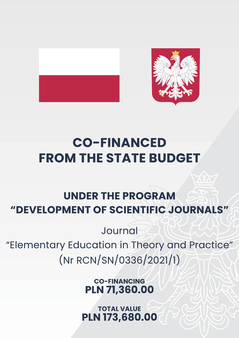Leisure Time of Children at the Preschool and Early-School Ages: Organization and Forms – Pedagogical Reflections
Abstract
Free time is one of the fundamental concepts of pedagogy. The modern world, in all its dynamism, requires that we take a reflective and responsible look at the question of the organisation of free time. In the literature pertaining to this field of study, it is usually assumed that free time is time at the disposal of the individual after any obligatory tasks have been performed. It is usually used in order to relax, recharge one’s physical and mental health, for entertainment and for pursuing voluntary or disinterested social activities, to develop interests, passions and talents, or for the self-education of the individual. Thus formulated, our definition of it is multidimensional, as it involves many aspects of human functioning and draws attention to both the individual and social dimensions of leisure time. Problems connected with free time constitute an important aspect of the work of the kindergarten or early-school teacher, because they concern the development of rational habits connected with how a child’s free time is to be organized and spent, in both preschool and early-school environments. The kindergarten and early-school ages represent a period characterized by volatility in respect of interests and tastes, with all too little in the way of a grasp of the consequence of actions, or of choices being made to meet specific desires and goals. This is due to the fact that children, at a certain stage of their development, need practice if they are to choose the most suitable forms of active leisure for themselves and for each other. In encouraging valuable and thoughtful decision-making in children with respect to their management of their own free time, the latter need to be shown wise and rational ways of spending it. It should also be kept in mind that leisure time greatly influences the development of attitudes and value systems amongst both children and young people.
References
Banaszkiewicz T., Wychowanie dzieci i młodzieży do rekreacji na progu reformy oświaty, Wydawnictwo AJD, Częstochowa 2005.
Bee H., Psychologia rozwoju człowieka, Wydawnictwo Zysk i Spółka, Poznań 2004.
Czajkowski K., Wychowanie do rekreacji, WSiP, Warszawa 1979.
Dąbrowski Z., Czas wolny dzieci i młodzieży, PZWS, Warszawa 1966.
Denek K., Pedagogiczne aspekty czasu wolnego, „Lider’’ 2006, no. 12.
Drost M., Czas wolny, czas stracony, „Życie Szkoły” 2007, no. 4.
Dyszkowska J., Pedagogika czasu wolnego – wokół tradycyjnych funkcji i nowych zadań, „Kwartalnik Edukacyjny” 2006, no. 4.
Gwozda M., Czas wolny, [w:] Mały Leksykon Pedagoga Wczesnoszkolnego, ed. J. Karbowniczek, Wydawnictwo Erica, Warszawa 2014.
Kamiński A., Czas wolny i jego problematyka społeczno-wychowawcza, Zakład Narodowy im. Ossolińskich, Wrocław 1965.
Marzec H., Czas wolny małych dzieci w rodzinie, „Problemy Opiekuńczo-Wychowawcze” 2004, no. 2.
Migdał K., Psychologia czasu wolnego, Wydawnictwo AlmaMer,
Wyższa Szkoła Ekonomiczna, Warszawa 2011.
Mroczkowska D., Czas wolny. Refleksje, dylematy, perspektywy, Wydawnictwo Difin S.A., Warszawa 2011.
Pięta J., Pedagogika czasu wolnego, Wydawnictwo AlmaMer, Warszawa 2004.
Sadowska E., Skoczylas-Krotla E, Czas wolny dziecka – wybrane aspekty zagadnienia, „Edukacja Elementarna w Teorii i Praktyce” 2007, no. 3.
Skreczko A., Czas wolny dziecka, „Czas Miłosierdzia” 2004, no. 8.
Świerzbińska K., Czas wolny to problem pedagogiczny, „Edukacja i Dialog” 2004, no. 2.
Taboł S., Wpływ rodziny na wykorzystanie czasu wolnego, „Życie Szkoły” 2002, no. 3.
Walasik R., Czas wolny dzieci ze środowisk zróżnicowanych kulturowo, „Edukacja i Dialog” 2012, no. 1, 2.
Winiarski K., Rekreacja i czas wolny, „Łośgraf”, Warszawa 2012.
Wnuk-Lipiński E., Praca i wypoczynek w budżecie czasu, Zakład Narodowy im. Ossolińskich, Wrocław 1972.
Wujek T., Praca domowa i czynny wypoczynek ucznia, PZWS, Warszawa 1974.
Copyright (c) 2015 Elementary Education in Theory and Practice

This work is licensed under a Creative Commons Attribution-NoDerivatives 4.0 International License.
- When submitting a text, the author declares that he/she is the Author of the article (hereinafter referred to as the “Work”) and:
- he/she owns the exclusive and unlimited copyright to the Work,
- is entitled to dispose of the copyright to the Work.
Declares that it does not infringe any third party copyrights or legal rights.
Declares that there is no conflict of interest.
2. At the same time, the Author grants the Ignatianum University in Cracowa royalty-free, non-exclusive and territorially unlimited licence to use the Work in the following fields of exploitation:
- recording the Work in a hard copy, as well as on a digital or magnetic medium;
- reproduction of the Work using any technique, without limitation of the number of editions or copies;
- distribution of the Work and its copies on any medium, including marketing, sale, lending, and rental;
- introduction of the Work into a computer memory;
- disseminating the Work in information networks, including in the Internet;
- public performance, exhibition, display, reproduction, broadcasting and re-broadcasting, as well as making the Work available to the public in such a way that everyone can have access to it at a time and place of their own choosing;
- within the scope of dependent rights to the Work, including in particular the right to make necessary changes to the Work resulting from editorial and methodical development, as well as to translate the Work into foreign languages;
The licence is granted from the moment of the transfer of the Work to the Ignatianum University in Cracow. The Ignatianum University in Cracow is entitled to grant further sub-licences to the Work within the scope of the right granted. The licence is time-limited and it is granted for a period of 15 years, starting from the date of its granting.
Authors are permitted and encouraged to publish their text online (e.g. in their institution’s repository or on the institution’s website) before or during the submission process as this may lead to beneficial exchanges, as well as earlier and greater citation of the published text (See The Effect of Open Access). We recommend using any of the following portals of research associations:
- ResearchGate
- SSRN
- Academia.edu
- Selected Works
- Academic Search





